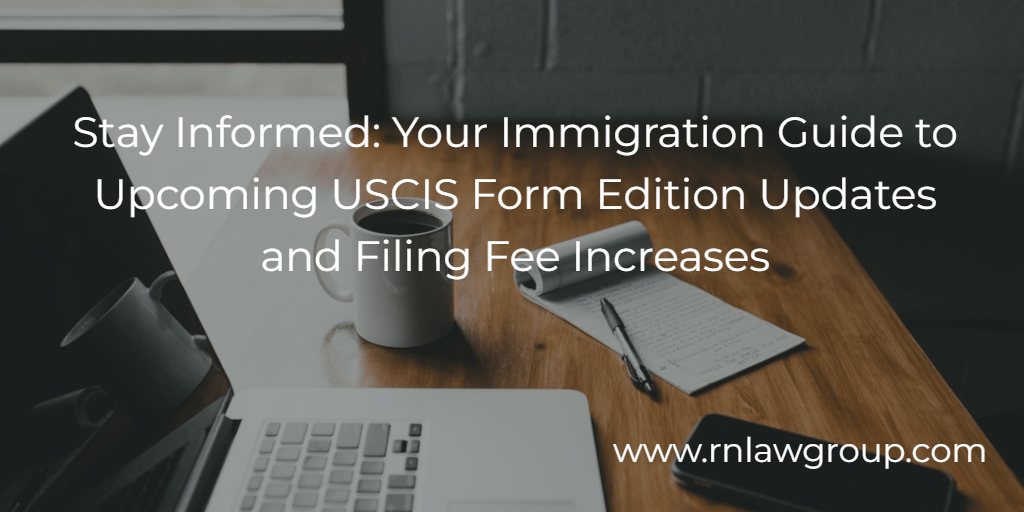
Stay Informed: Your Immigration Guide to Upcoming USCIS Form Edition Updates and Filing Fee Increases
On April 1, 2024, the United States Citizenship and Immigration Services (USCIS) is set to implement updates not only to certain forms crucial for immigration processes but also to the applicable filing fees to many editions of the USCIS forms that are not scheduled to be updated in the coming weeks. This announcement underscores the critical importance of staying informed about these changes, as non-compliance could have severe repercussions for individuals navigating the immigration system.
The USCIS regularly revises its forms to ensure accuracy, efficiency, and compliance with evolving immigration laws and regulations. These updates are essential for streamlining the immigration process, maintaining data integrity, and facilitating timely and accurate adjudication of immigration benefits. Alongside these form revisions, USCIS also periodically adjusts filing fees to cover the cost of processing applications and providing services.
The forms subject to the upcoming form edition updates cover various aspects of immigration processes, including applications for visas, work permits, green cards, and citizenship. Among the relevant employment-based forms scheduled for revision that must be filed with the new applicable filing fee are the I-129, Petition for a Nonimmigrant Worker, the I-129CW, Petition for a CNMI-Only Nonimmigrant Transitional Worker, and the I-140, Immigrant Petition for Alien Workers.
In addition to form revisions, USCIS is set to increase filing fees for various applications and petitions. These fee adjustments are based on the USCIS Final fee rule effective April 1, 2024. USCIS has published a helpful “New Fee Schedule Table” on its website in an update notice titled Frequently Asked Questions on the USCIS Fee Rule which depicts the differences in fee changes and how they also can vary depending on how the application is filed (online filing vs paper filing). Through the implementation and enforcement of these fee increases, USCIS has taken action to modify specific fees associated with immigration and naturalization benefit requests for the first time since 2016. In doing so, USCIS aims to more adequately recoup its operational expenses and facilitate the prompt processing of new applications and providing other services to make the process more efficient overall.
It is crucial for individuals to be aware of these fee increases and plan accordingly when submitting their immigration applications. The significance of monitoring these updates, including both form revisions and filing fee increases, cannot be overstated. Failure to use the latest form edition or pay the updated filing fees can lead to delays, rejections, or denials of immigration applications. This could disrupt individuals’ plans, prolong their immigration journey, and potentially jeopardize their legal status in the United States.
One of the risks associated with not complying with USCIS form edition updates and filing fee increases is the rejection of applications. USCIS strictly enforces the use of current form editions and requires payment of the correct filing fees. Submitting outdated forms or incorrect fees will likely result in rejection, necessitating resubmission and consuming additional time and resources.
Furthermore, delays in filing due to non-compliance with form updates and fee increases can have significant implications for individuals’ immigration status. Timely filing is crucial for maintaining legal status, especially for nonimmigrant visa holders seeking extensions or changes of status. Missing deadlines due to form-related issues or insufficient fees could result in unlawful presence and potential consequences such as deportation or bars on reentry to the United States. This is a particularly critical error to avoid for those filing I-129 petitions to extend a non-immigrant’s stay in the U.S. ending on April 1st, or those any status change or extension for that matter that must be filed before an I-94 number expiring on April 1st. The same is applicable for the Form I-140 if timely filing and/or approval is necessary to extend one’s stay in the U.S. beyond their allotted maximum validity period.
To mitigate these risks, individuals and immigration practitioners must stay informed about USCIS form edition updates and filing fee increases. USCIS provides timely announcements and resources on its website to help stakeholders stay abreast of changes to forms, fees, and procedures. Additionally, immigration attorneys and accredited representatives can offer valuable guidance and assistance in navigating the complexities of the immigration process, ensuring compliance with form requirements and fee obligations. Consider incorporating these additional tips to ensure the utilization of new forms and accurate fee inclusion:
- Review Instructions Carefully: Instructions often include information about the latest form edition and required filing fees.
- Download Forms from Official Sources: Obtain forms directly from the USCIS website now or as the effective date of the update approaches to ensure you have the most current version. Using outdated forms downloaded from unofficial sources can result in rejection.
- Double-Check Form Editions: Before submitting any applications, verify that you are using the most recent edition of the form which is typically indicated on the bottom left corner of the USCIS form.
- Calculate Fees Accurately: Refer to the USCIS Fee Schedule or Fee Calculator to determine the correct filing fees for your application type. Take into account any fee increases that may have come into effect.
- Keep Records: Ensure that copies of all forms, proof of filing fee paid, and supporting documents submitted to USCIS are kept by you or your immigration attorney. This documentation can be valuable for tracking the progress of your application and resolving any issues that may arise.
In conclusion, monitoring USCIS form edition updates and filing fee increases is essential for individuals navigating the immigration system. Failure to comply with these updates can lead to various risks, including application rejections, processing delays, and adverse effects on immigration status. By staying informed and adhering to the latest form requirements and fee obligations, applicants can help facilitate smoother and more efficient processing of their immigration benefits, thereby safeguarding their legal status and pursuing their goals in the United States.
Reddy & Neumann has been serving the business community for over 20 years and is Houston’s largest immigration law firm focused solely on U.S. Employment-based immigration. We work with both employers and their employees, helping them navigate the immigration process quickly and cost-effectively.
By: Jeanetly Garcia
Jeanetly Garcia advises employers and individuals through all phases of the non-immigrant visa process. As an attorney in the H-1B Department at Reddy Neumann Brown PC she is experienced in filing nonimmigrant petitions and applications for immigrant benefits, as well as, responding to USCIS issued requests for evidence concerning an array of legal issues.

